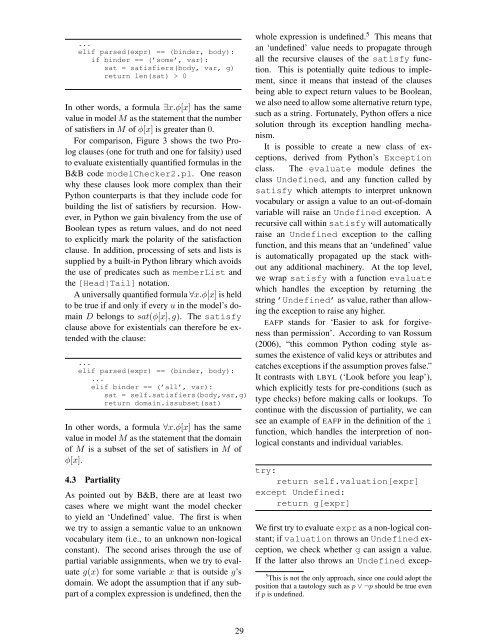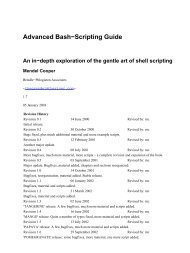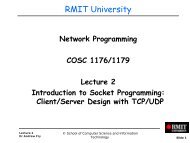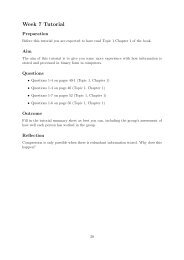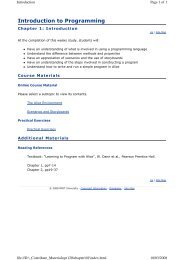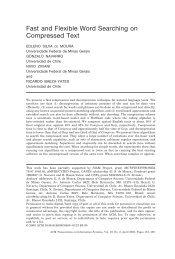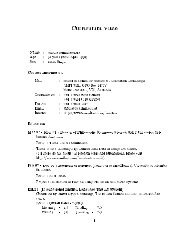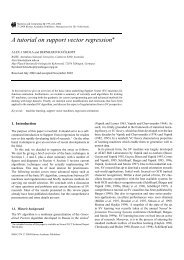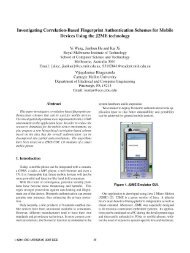Automatic Mapping Clinical Notes to Medical - RMIT University
Automatic Mapping Clinical Notes to Medical - RMIT University
Automatic Mapping Clinical Notes to Medical - RMIT University
Create successful ePaper yourself
Turn your PDF publications into a flip-book with our unique Google optimized e-Paper software.
...<br />
elif parsed(expr) == (binder, body):<br />
if binder == (’some’, var):<br />
sat = satisfiers(body, var, g)<br />
return len(sat) > 0<br />
In other words, a formula ∃x.φ[x] has the same<br />
value in model M as the statement that the number<br />
of satisfiers in M of φ[x] is greater than 0.<br />
For comparison, Figure 3 shows the two Prolog<br />
clauses (one for truth and one for falsity) used<br />
<strong>to</strong> evaluate existentially quantified formulas in the<br />
B&B code modelChecker2.pl. One reason<br />
why these clauses look more complex than their<br />
Python counterparts is that they include code for<br />
building the list of satisfiers by recursion. However,<br />
in Python we gain bivalency from the use of<br />
Boolean types as return values, and do not need<br />
<strong>to</strong> explicitly mark the polarity of the satisfaction<br />
clause. In addition, processing of sets and lists is<br />
supplied by a built-in Python library which avoids<br />
the use of predicates such as memberList and<br />
the [Head|Tail] notation.<br />
A universally quantified formula ∀x.φ[x] is held<br />
<strong>to</strong> be true if and only if every u in the model’s domain<br />
D belongs <strong>to</strong> sat(φ[x], g). The satisfy<br />
clause above for existentials can therefore be extended<br />
with the clause:<br />
...<br />
elif parsed(expr) == (binder, body):<br />
...<br />
elif binder == (’all’, var):<br />
sat = self.satisfiers(body,var,g)<br />
return domain.issubset(sat)<br />
In other words, a formula ∀x.φ[x] has the same<br />
value in model M as the statement that the domain<br />
of M is a subset of the set of satisfiers in M of<br />
φ[x].<br />
4.3 Partiality<br />
As pointed out by B&B, there are at least two<br />
cases where we might want the model checker<br />
<strong>to</strong> yield an ‘Undefined’ value. The first is when<br />
we try <strong>to</strong> assign a semantic value <strong>to</strong> an unknown<br />
vocabulary item (i.e., <strong>to</strong> an unknown non-logical<br />
constant). The second arises through the use of<br />
partial variable assignments, when we try <strong>to</strong> evaluate<br />
g(x) for some variable x that is outside g’s<br />
domain. We adopt the assumption that if any subpart<br />
of a complex expression is undefined, then the<br />
29<br />
whole expression is undefined. 5 This means that<br />
an ‘undefined’ value needs <strong>to</strong> propagate through<br />
all the recursive clauses of the satisfy function.<br />
This is potentially quite tedious <strong>to</strong> implement,<br />
since it means that instead of the clauses<br />
being able <strong>to</strong> expect return values <strong>to</strong> be Boolean,<br />
we also need <strong>to</strong> allow some alternative return type,<br />
such as a string. Fortunately, Python offers a nice<br />
solution through its exception handling mechanism.<br />
It is possible <strong>to</strong> create a new class of exceptions,<br />
derived from Python’s Exception<br />
class. The evaluate module defines the<br />
class Undefined, and any function called by<br />
satisfy which attempts <strong>to</strong> interpret unknown<br />
vocabulary or assign a value <strong>to</strong> an out-of-domain<br />
variable will raise an Undefined exception. A<br />
recursive call within satisfy will au<strong>to</strong>matically<br />
raise an Undefined exception <strong>to</strong> the calling<br />
function, and this means that an ‘undefined’ value<br />
is au<strong>to</strong>matically propagated up the stack without<br />
any additional machinery. At the <strong>to</strong>p level,<br />
we wrap satisfy with a function evaluate<br />
which handles the exception by returning the<br />
string ’Undefined’ as value, rather than allowing<br />
the exception <strong>to</strong> raise any higher.<br />
EAFP stands for ‘Easier <strong>to</strong> ask for forgiveness<br />
than permission’. According <strong>to</strong> van Rossum<br />
(2006), “this common Python coding style assumes<br />
the existence of valid keys or attributes and<br />
catches exceptions if the assumption proves false.”<br />
It contrasts with LBYL (‘Look before you leap’),<br />
which explicitly tests for pre-conditions (such as<br />
type checks) before making calls or lookups. To<br />
continue with the discussion of partiality, we can<br />
see an example of EAFP in the definition of the i<br />
function, which handles the interpretion of nonlogical<br />
constants and individual variables.<br />
try:<br />
return self.valuation[expr]<br />
except Undefined:<br />
return g[expr]<br />
We first try <strong>to</strong> evaluate expr as a non-logical constant;<br />
if valuation throws an Undefined exception,<br />
we check whether g can assign a value.<br />
If the latter also throws an Undefined excep-<br />
5 This is not the only approach, since one could adopt the<br />
position that a tau<strong>to</strong>logy such as p ∨ ¬p should be true even<br />
if p is undefined.


